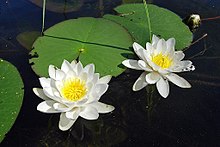Nymphaea candida
| Nymphaea candida | |
|---|---|

| |
| Scientific classification | |
| Kingdom: | Plantae |
| Clade: | Tracheophytes |
| Clade: | Angiosperms |
| Order: | Nymphaeales |
| Family: | Nymphaeaceae |
| Genus: | Nymphaea |
| Species: | N. candida
|
| Binomial name | |
| Nymphaea candida | |
Nymphaea candida J. Presl is a species of flowering plant in the genus Nymphaea, native to quiet freshwater habitats in Eurasia, it is in flower from July to August. It is sometimes treated as a subspecies of N. alba (N. alba L. subsp. candida (J. Presl) Korsh.)
Description
[edit]Nymphaea candida is an aquatic herbaceous perennial that is laticiferous and rooted. It has a spread of approximately 60 cm and a plant depth from 10 to 30 cm. It has rhizomes that are stoloniferous and unbranched. There are about 10-20 leaves that are 9–19 cm across that are usually floating or submerged. The leaves are membranous when young and prominently veined when mature. The plant prefers growing in water-depths of about 60–80 cm.
Nymphaea candida has a small white flower (10–20 cm across) with a yellow center. The bisexual flower usually floats alone. The peduncles are long and there are 4 sepals. There are about 12-24 petals on each flower. The petals can be described as oblong-ovate, apex obtuse, and white. The outer petals are shorter than the inner ones.[1]
Cytology
[edit]The chromosome count is n = 56. The genome size is 1936.44 Mb.[2]
Taxonomy
[edit]The plant was originally discovered and described by J. Presl and C Presl. in 1882. The taxonomic status of this species is unknown.[3]
Synonyms
[edit]- Castalia biradiata (Sommerauer) Hayek
- Castalia candida (C. Presl) Schinz & Thell.
- Castalia colchica Woronow ex Grossh.
- Castalia semiaperta (C. Klinggr.) Fritsch
- Leuconymphaea candida (C. Presl) Kuntze
Distribution and habitat
[edit]It grows in the quiet freshwaters in Eurasia. The plant grows only in water, as it is an aquatic plant, mainly in ponds, lakes, and slow flowing streams.[4]
References
[edit]- ^ "Nymphaea candida C. Presl". India Biodiversity Portal. Retrieved 2016-12-06.
- ^ Chen, F., Liu, X., Yu, C., Chen, Y., Tang, H., & Zhang, L. (2017). "Water lilies as emerging models for Darwin’s abominable mystery." Horticulture research, 4.
- ^ GBIF. "Nymphaea candida C. Presl - Checklist View". www.gbif.org. Retrieved 2016-12-06.
- ^ "medicinal herbs: NYMPHAEA CANDIDA". www.naturalmedicinalherbs.net. Retrieved 2016-12-06.


